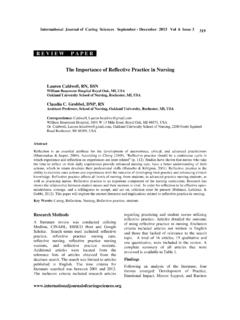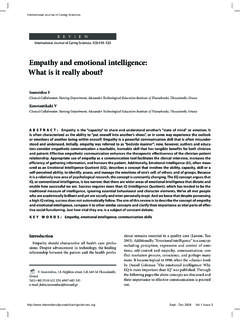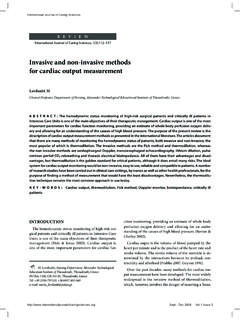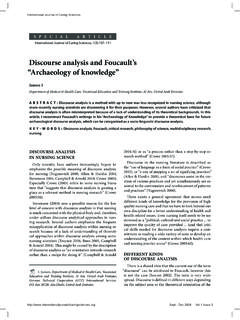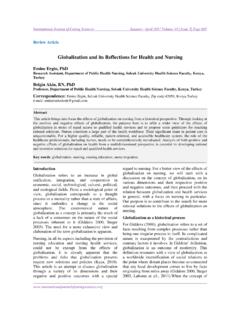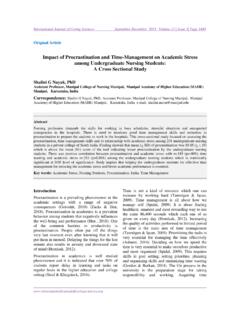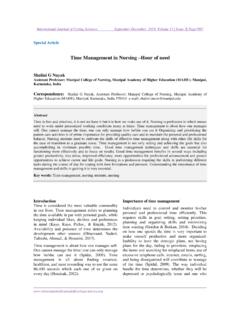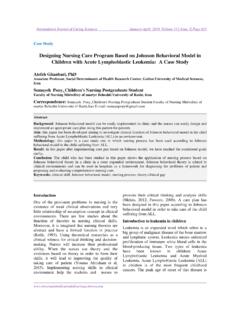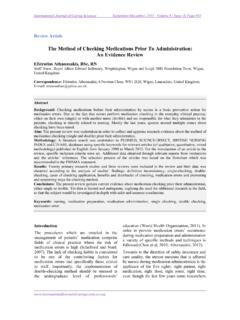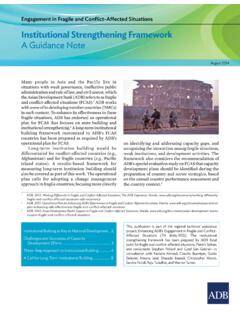Transcription of Implementation of Watson’s Theory of Human Caring: A …
1 International Journal of Caring Sciences January-April 2015 Volume 8 Issue 1 Page 25 O R I G I N A L P A P E R Implementation of Watson s Theory of Human Caring: A Case Study Yeter Durgun Ozan, PhD, BSN Assistant professor, School of Nursing, University of Dicle, Diyarbak r, Turkey H lya Okumu , Professor, ifa niversit, Faculty of Health Sciences, Izmir, Turkey Ayhan Aytekin Lash, PhD, RN, FAAN Professor Emeritus, School of Nursing and Health Studies, Northern Illinois University DeKalb, Illinois, USA Correspondence: Ayhan Aytekin Lash, Professor Emeritus, School of Nursing and Health Studies, Northern Illinois University DeKalb, Illinois, USA E-mail: Abstract This manuscript presents a case study detailing the application, and the outcome, of the Watson's Theory of Human Caring to an infertile woman receiving in vitro fertilization treatment. The implementations of the ten carative factors, inherent in the Theory , to provide a supportive nursing care are chronicled.
2 The sustained nurse-patient interaction and the achievement of the ultimate goal of having the patient reach the phase of health-healing-wellness (carative factor #7) were detailed. This case study is an example of the value of a Theory -based nursing practice that can enhance Human health and healing in stressful life events, such as the moment when the patient in this case study realized her inability to have conceived a much desired child, even with promising medical treatments, and turned to her nurse for healing. Keywords: Infertility, unsuccessful IVF treatment, Watson s Theory of Human caring Introduction Infertility is not only a physiological problem but it is one that can initiate a life crisis that is experienced with psychological, familial, social, and cultural consequences (Devine, 2003). Hence, increasingly, infertile couples look for a recovery from this life crisis and often turn to in-vitro-fertilization (IVF) for solutions.
3 In the beginning of the treatment, couples are hopeful that a pregnancy will occur (Boden, 2007). However, success is not a given, repeated treatments may be needed before fertilization is achieved. Given the recurrent need for retreatment, from the very beginning it is important that health care professional assess how the women may adjust to unsuccessful outcomes. In fact, this early assessment may be the key to prepare them to cope with feelings of failure, loss, hopelessness, and regain the emotional health to initiate retreatment. This early assessment is also necessary because evidence suggests that women cannot become pregnant if they are under emotional distress during the treatments (Durgun-Ozan & Okumu , 2013; Benyamini, Gozlan & Kokia, 2005; Widge 2005; Verhaak et al, 2005; Franco et al, 2002; Hammarberg, 2001). Further, Fawcett (2005) and others (Chin, 2001; Fawcett et al, 2001), indicate that when unsuccessful IVF treatment occurs, giving nursing care based on nursing-specific theories that provide holistic nursing care, including individual assessment, observation, and a keen focus on problems unique to each woman, may be essential.
4 In terms of clinical application of these studies, it is evident that the women undergoing fertility treatments need constant monitoring of emotional health in tandem with Theory -based emotional support, and a nursing approach that is based on close, individualized, when possible, face-to-face contact (Durgun-Ozan & Okumu , 2013). A recent (2014) randomized study reported that nursing care based on Watson s Theory of Human Caring International Journal of Caring Sciences January-April 2015 Volume 8 Issue 1 Page 26 decreased the negative impact of infertility in women receiving infertility treatment (Arslan- zkan, Okumu & Bulduko lu, 2014). Therefore, the goal in this particular nursing case study was to prepare an infertile woman to accept an outcome of an initially unsuccessful treatment and, at an appropriate time, support the woman in her decision to try re-treatment.
5 In order to reach this goal, however, it was explore and delineate the kind of nursing interventions that would be effective in helping the infertile woman cope with her negative feelings about self, and thereby, improve her sense of well-being (Payne & Goedeke, 2007). Hence, this case was undertaken to assess and evaluate the Implementation of the Watson s Theory of Human Caring to the care of a woman who has had unsuccessful IVF treatment at first attempt. Watson s Theory of Human Caring The Theory of Watson s Human Caring focuses on Human and nursing paradigm (Fawcett, 2005). It asserts that a Human being cannot be healed as an object. It argues, on the contrary, that he/she is part of his/her self, environment, nature, and the larger universe. In this Theory , the environment is defined as comfortable, beautiful, and peaceful (Lukaose, 2011; Watson, 2009; Watson, 2007) and that caring is the moral ideal that entails mind-body-soul engagement with one another.
6 Nursing is categorized as a humanitarian science and characterized as a profession that performs personal, scientific, ethical, and aesthetical practice. Watson s Theory of Human Caring aims to ensure a balance and harmony between health and illness experiences of a person. Watson states that in a holistic approach to caring for a Human , there are mind-body-spirit sub-dimensions, all of which reflect the whole as the whole is different from her/his sub-dimensions (Jesse, 2006; Fawcett, 2005; Cara, 2003). Therefore, applying Watson s Theory of Human Caring to the nursing care of infertile woman, in this case study, found to be a fitting approach for the following reasons: 1) Theory of Human Caring is people-oriented that accepts the peculiar dimensions of Human integrity without compromising its mind-body-spirit (Jesse, 2006; Fawcett, 2005; Watson & Foster, 2003; Rafael, 2000). 2) The Theory signifies that love is the most important healing source in nursing care (Watson, 2012).
7 3) The Theory defines nursing as the process of Human -to- Human caring (Fawcett, 2005) which consists of four basic concepts: healing processes, interpersonal maintenance of relationship, the caring moment, and awareness of healing. 4) The ten carative factors inherent in the Theory and the well delineated caritas process (Table 1) provide lucid guide to clinical Implementation of the Theory . Based on the above characteristics of the Theory , the case study design was chosen as a method of study. Case studies are in-depth investigation of a single entity or a small number of entities (Polit & Beck, 2008) which may be an individual, family, group, or other social units. The case study approach is particularly valuable for health science research to test and further develop theories, evaluate programs, and develop interventions. Case studies are empirical methods to demonstrate how a Theory may be applied to practice (Baxter & Jack, 2008).
8 Consisted with the method of single case study, the first author, a clinician and a nurse-investigator, developed a practice protocol based on Watson Theory of Human Caring, to care for an infertile woman who has had unsuccessful IVF treatment. Case Study Case Study Objectives 1. Explore Theory -based approaches to the holistic care of women with unsuccessful IVF treatment that can assist health care professionals in this specialty to provide effective nursing care. 2. To ascertain the effectiveness of Watson s Theory of Human Caring in assisting women to cope with unsuccessful IVF treatments in traditional cultures where women s infertility is equated with dishonor and shame. Method Participant selection and ethical considerations Initially an approval for this single-case case study was obtained from the institutional review board of the medical center that operated the IVP clinic in a city located in the Southern part of Turkey.
9 The participant for this study was, then, randomly selected from the group of individuals receiving care at the clinic. The participant was first asked verbally if she would International Journal of Caring Sciences January-April 2015 Volume 8 Issue 1 Page 27 be willing to participate in the study. When the response was affirmative, a written consent was obtained. The consent form assured confidentiality and described the specific nature of the case method, and particularly that it was a nursing study. It also stated that the participation was voluntary and that she could withdraw from the study anytime and that the withdrawal would have no impact, what-so-ever, on the care she was receiving. Table 1. Ten carative factors and caritas processes Carative factors Caritas processes 1. Humanistic altruistic system of values. Practicing loving-kindness/compassion and equanimity for self/other.
10 2. Enabling faith-hope Being authentically present; enabling belief system and subjective world of self/other 3. Cultivation of sensitivity to self and others Cultivating own spiritual practices; beyond ego-self to authentic transpersonal presence 4. Helping-trusting, Human care relationship Sustaining a loving, trusting and caring relationship. 5. Expression of positive and negative feelings Allowing for expression of feelings; authentically listening and holding another person s story for them 6. Creative problem-solving caring process Creatively solution seeking through caring process, full use of self; all ways of knowing/doing/being; engage in artistry of Human caring-healing practices and modalities 7. Transpersonal teaching-learning. Authentic teaching-learning within context of caring relationship; stay within other s frame of reference; shift toward a health-healing-wellness coaching model 8. Supportive, protective, and/or corrective mental, social, spiritual environment.
